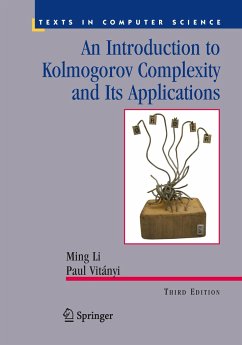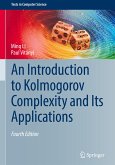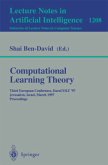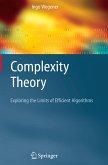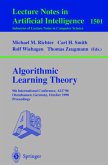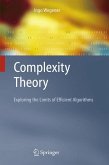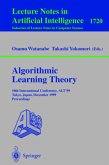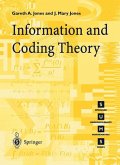"The book is outstanding and admirable in many respects. ... is necessary reading for all kinds of readers from undergraduate students to top authorities in the field." Journal of Symbolic Logic
Written by two experts in the field, this is the only comprehensive and unified treatment of the central ideas and applications of Kolmogorov complexity. The book presents a thorough treatment of the subject with a wide range of illustrative applications. Such applications include the randomness of finite objects or infinite sequences, Martin-Loef tests for randomness, information theory, computational learning theory, the complexity of algorithms, and the thermodynamics of computing. It will be ideal for advanced undergraduate students, graduate students, and researchers in computer science, mathematics, cognitive sciences, philosophy, artificial intelligence, statistics, and physics. The book is self-contained in that it contains the basic requirements from mathematics and computerscience. Included are also numerous problem sets, comments, source references, and hints to solutions of problems. New topics in this edition include Omega numbers, Kolmogorov-Loveland randomness, universal learning, communication complexity, Kolmogorov's random graphs, time-limited universal distribution, Shannon information and others.
Written by two experts in the field, this is the only comprehensive and unified treatment of the central ideas and applications of Kolmogorov complexity. The book presents a thorough treatment of the subject with a wide range of illustrative applications. Such applications include the randomness of finite objects or infinite sequences, Martin-Loef tests for randomness, information theory, computational learning theory, the complexity of algorithms, and the thermodynamics of computing. It will be ideal for advanced undergraduate students, graduate students, and researchers in computer science, mathematics, cognitive sciences, philosophy, artificial intelligence, statistics, and physics. The book is self-contained in that it contains the basic requirements from mathematics and computerscience. Included are also numerous problem sets, comments, source references, and hints to solutions of problems. New topics in this edition include Omega numbers, Kolmogorov-Loveland randomness, universal learning, communication complexity, Kolmogorov's random graphs, time-limited universal distribution, Shannon information and others.
From the reviews of the second edition:
"We are indeed in the information age and the scientific exploration of information and the laws that govern its behavior has taken center stage in the dramatic development of sciences. Kolmogorov complexity is a central concept and a powerful tool in the understanding of the quantitative nature of information and its processing and transmission. Li and Vitanyi's book beautifully captures the elegance of these ideas, their relevance to more of computer science and their theoretical as well as practical applications. The basic concepts of Kolmogorov complexity should be understood by any technically educated person, and they should be studied by all computer scientists. Li and Vitanyi have provided an ideal book for the exploration of a deep, beautiful and important part of the computer science."
Juris Hartmanis, (Turing Award Winner 1993), NSF, Washington D.C.
"Special attention is paid to the theory underlying inductive inference and its potential applications. The book is likely to remain the standard treatment of Kolmogorov complexity for a long time."
Jorma J. Rissanen, IBM Research, California
"The book of Li and Vitanyi is unexcelled."
Ray J. Solomonoff, Oxbridge Research, Cambridge, Massachusetts
"The book is outstanding . . . the authors did their job unbelievably well...necessary reading for all kinds of readers from undergraduate students to top authorities in the field."
Vladimir A. Uspensky and Alexander K. Shen, Journal of Symbolic Logic
"It is clear that this book will become 'the' Kolmogorov complexity book."
Marius Zimand, Mathematical Reviews
From the reviews of the third edition:
"Kolmogorov complexity, algorithmic information theory, minimum description length, and other information-based disciplines have experienced a phenomenal explosion in the last decade. ... is thisthird edition worth reading? Yes, it is. The authors have added an extra 204 pages, distributed throughout the book ... . Eight new figures were also added. Most impressively, 301 new references were added, bringing the total to 820. ... It is sure to maintain its reputation ... ." (Jacques Carette, ACM Computing Reviews, April, 2009)
"We are indeed in the information age and the scientific exploration of information and the laws that govern its behavior has taken center stage in the dramatic development of sciences. Kolmogorov complexity is a central concept and a powerful tool in the understanding of the quantitative nature of information and its processing and transmission. Li and Vitanyi's book beautifully captures the elegance of these ideas, their relevance to more of computer science and their theoretical as well as practical applications. The basic concepts of Kolmogorov complexity should be understood by any technically educated person, and they should be studied by all computer scientists. Li and Vitanyi have provided an ideal book for the exploration of a deep, beautiful and important part of the computer science."
Juris Hartmanis, (Turing Award Winner 1993), NSF, Washington D.C.
"Special attention is paid to the theory underlying inductive inference and its potential applications. The book is likely to remain the standard treatment of Kolmogorov complexity for a long time."
Jorma J. Rissanen, IBM Research, California
"The book of Li and Vitanyi is unexcelled."
Ray J. Solomonoff, Oxbridge Research, Cambridge, Massachusetts
"The book is outstanding . . . the authors did their job unbelievably well...necessary reading for all kinds of readers from undergraduate students to top authorities in the field."
Vladimir A. Uspensky and Alexander K. Shen, Journal of Symbolic Logic
"It is clear that this book will become 'the' Kolmogorov complexity book."
Marius Zimand, Mathematical Reviews
From the reviews of the third edition:
"Kolmogorov complexity, algorithmic information theory, minimum description length, and other information-based disciplines have experienced a phenomenal explosion in the last decade. ... is thisthird edition worth reading? Yes, it is. The authors have added an extra 204 pages, distributed throughout the book ... . Eight new figures were also added. Most impressively, 301 new references were added, bringing the total to 820. ... It is sure to maintain its reputation ... ." (Jacques Carette, ACM Computing Reviews, April, 2009)

